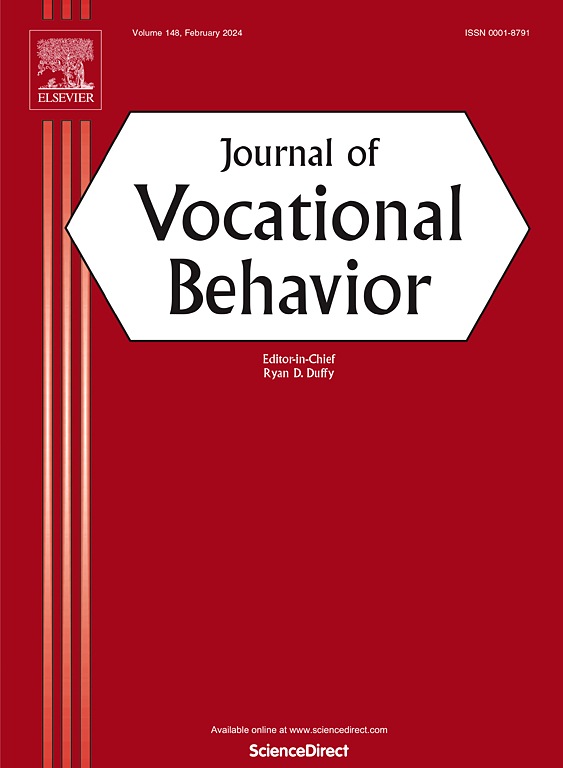下班后主管对信息通信技术(ICT)的需求对员工工作中的主动行为和不道德行为的影响:归因视角
IF 5.2
1区 心理学
Q1 PSYCHOLOGY, APPLIED
引用次数: 0
摘要
在数字化的工作场所中,上司要求员工在非工作时间保持联系并对工作做出响应,这种情况并不罕见。然而,对于下班后上司对信息通信技术(ICT)的要求如何以及何时影响员工的工作行为,我们却知之甚少。借鉴归因理论,我们的研究旨在揭示下班后上司的信息和通信技术要求对员工工作中的主动行为和不道德行为产生影响的潜在机制。我们收集了华东地区一家传媒公司(研究 1)的 397 名员工和一家零售企业(研究 2)的 493 名员工的数据,均采用了三波时滞设计。结果表明,下班后上司的信息和通信技术需求通过员工的绩效晋升归因与员工的主动行为正相关。员工的自我服务归因在这种要求与员工不道德行为之间起到了中介作用。此外,信息和通信技术中心地位加强了下班后上级信息和通信技术要求与员工主动行为之间的间接关系。具体来说,当员工认为信息和通信技术中心地位较高时,这种间接关系更强(相对较弱);当员工认为信息和通信技术中心地位较低时,这种间接关系更弱。本文讨论了理论和实践意义。本文章由计算机程序翻译,如有差异,请以英文原文为准。
The impacts of supervisory information communication technology (ICT) demands after hours on employee proactive behavior and unethical behavior at work: An attribution perspective
It is not unusual that employees are required by their supervisors to stay accessible and responsive to work during nonwork time in the digitalized workplace. Yet, we know little about how and when supervisory information communication technology (ICT) demands after hours influence employee behavior at work. Drawing on attribution theory, our research aims to unpack the underlying mechanisms that transmit the effects of supervisory ICT demands after hours on employee proactive behavior and unethical behavior at work. We collected data from 397 employees in a media company (Study 1) and 493 employees in a retail corporation (Study 2) in East China, both using a three-wave time-lagged design. Results showed that supervisory ICT demands after hours positively related to employee proactive behavior through employees' performance-promotion attribution. Employees' self-serving attribution mediated the positive association between such demands and employee unethical behavior. Moreover, ICT centrality strengthened the indirect relationship between supervisory ICT demands after hours and employee proactive behavior. Specifically, this indirect relationship was stronger (vs. weaker) when employees perceived higher (vs. lower) ICT centrality. Theoretical and practical implications are discussed.
求助全文
通过发布文献求助,成功后即可免费获取论文全文。
去求助
来源期刊

Journal of Vocational Behavior
PSYCHOLOGY, APPLIED-
CiteScore
13.10
自引率
5.40%
发文量
85
期刊介绍:
The Journal of Vocational Behavior publishes original empirical and theoretical articles offering unique insights into the realms of career choice, career development, and work adjustment across the lifespan. These contributions are not only valuable for academic exploration but also find applications in counseling and career development programs across diverse sectors such as colleges, universities, business, industry, government, and the military.
The primary focus of the journal centers on individual decision-making regarding work and careers, prioritizing investigations into personal career choices rather than organizational or employer-level variables. Example topics encompass a broad range, from initial career choices (e.g., choice of major, initial work or organization selection, organizational attraction) to the development of a career, work transitions, work-family management, and attitudes within the workplace (such as work commitment, multiple role management, and turnover).
 求助内容:
求助内容: 应助结果提醒方式:
应助结果提醒方式:


